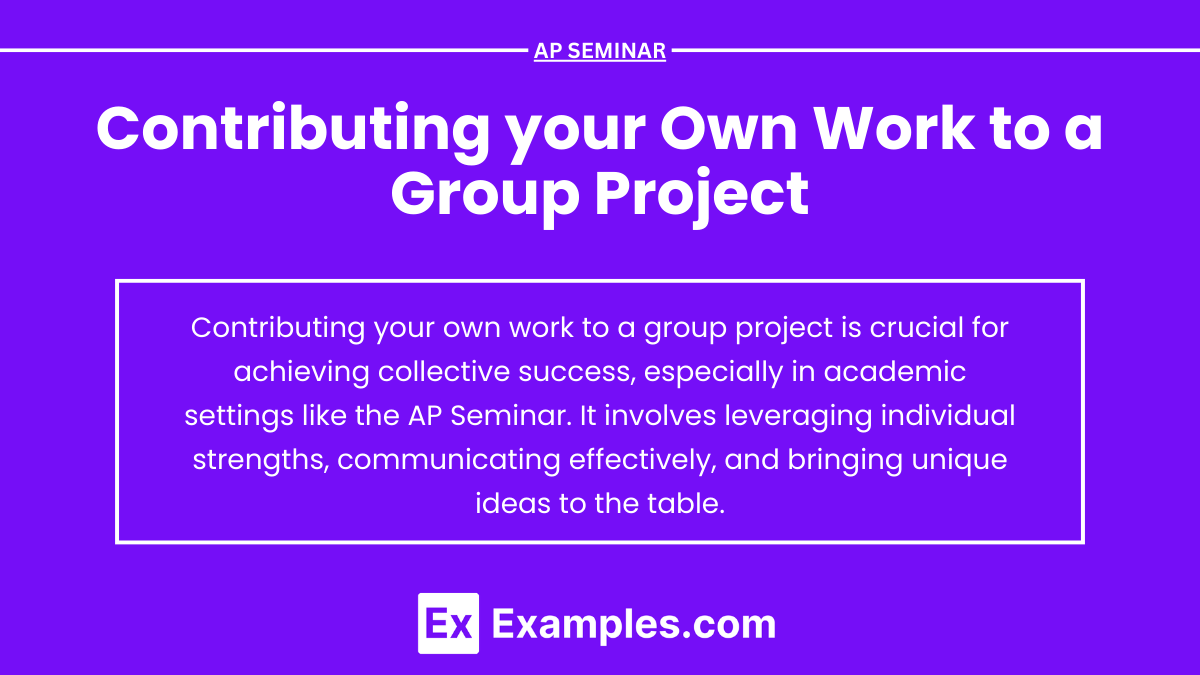Contributing your own work to a group project is crucial for achieving collective success, especially in academic settings like the AP Seminar. It involves leveraging individual strengths, communicating effectively, and bringing unique ideas to the table. Each member’s contributions, from thorough research to creative problem-solving, shape the project’s overall quality. Understanding the dynamics of collaboration and responsibility ensures that the group’s goals are met, making the experience enriching and educational for all involved.
Learning Objectives
In studying “Contributing Your Own Work to a Group Project” for the AP Seminar exam, you should focus on mastering collaborative skills, including effective communication, role identification, and task management. Develop the ability to conduct thorough research and synthesize information, contributing original analysis and insights. Enhance your writing and presentation skills, ensuring a cohesive and well-supported argument. Reflect on group dynamics and your contributions, learning to provide constructive feedback and assess the quality of both individual and group work.
Understanding the Role and Importance of Contribution
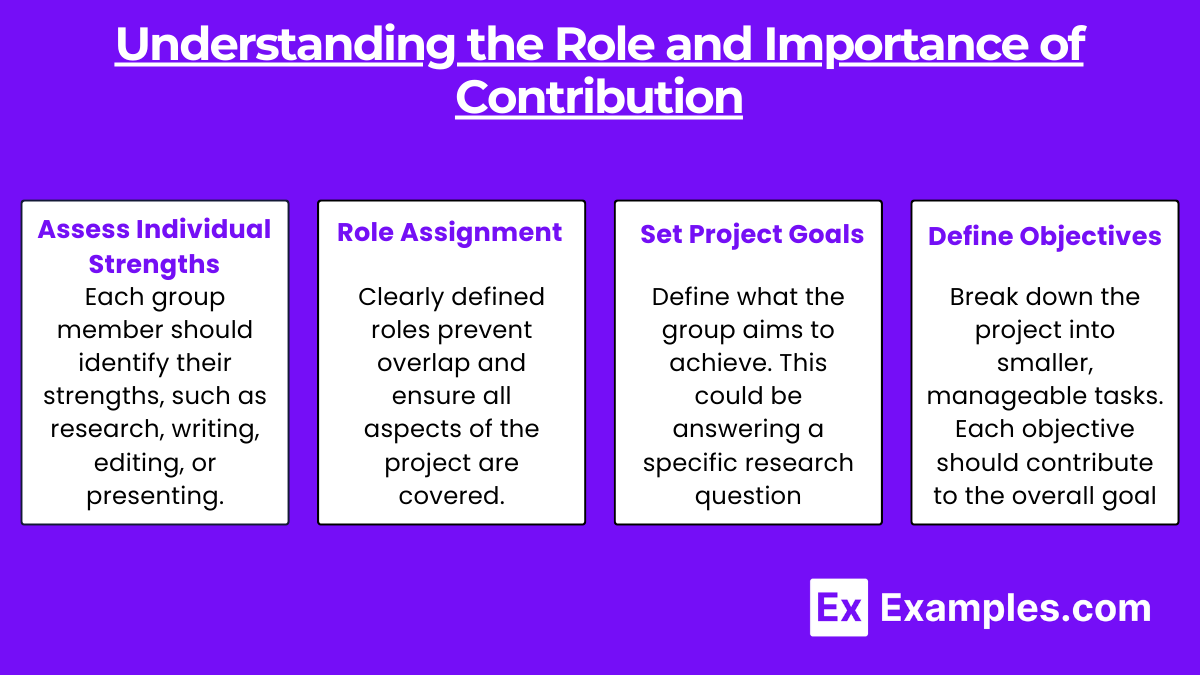
1. Identifying Strengths and Assigning Roles:
- Assess Individual Strengths: Each group member should identify their strengths, such as research, writing, editing, or presenting. This self-awareness helps in allocating tasks efficiently.
- Role Assignment: Clearly defined roles prevent overlap and ensure all aspects of the project are covered. Common roles include researcher, writer, editor, presenter, and project coordinator.
2. Establishing Clear Goals and Objectives:
- Set Project Goals: Define what the group aims to achieve. This could be answering a specific research question, developing a new perspective on an issue, or creating a comprehensive presentation.
- Define Objectives: Break down the project into smaller, manageable tasks. Each objective should contribute to the overall goal and be assigned to specific members based on their strengths.
Effective Communication and Collaboration
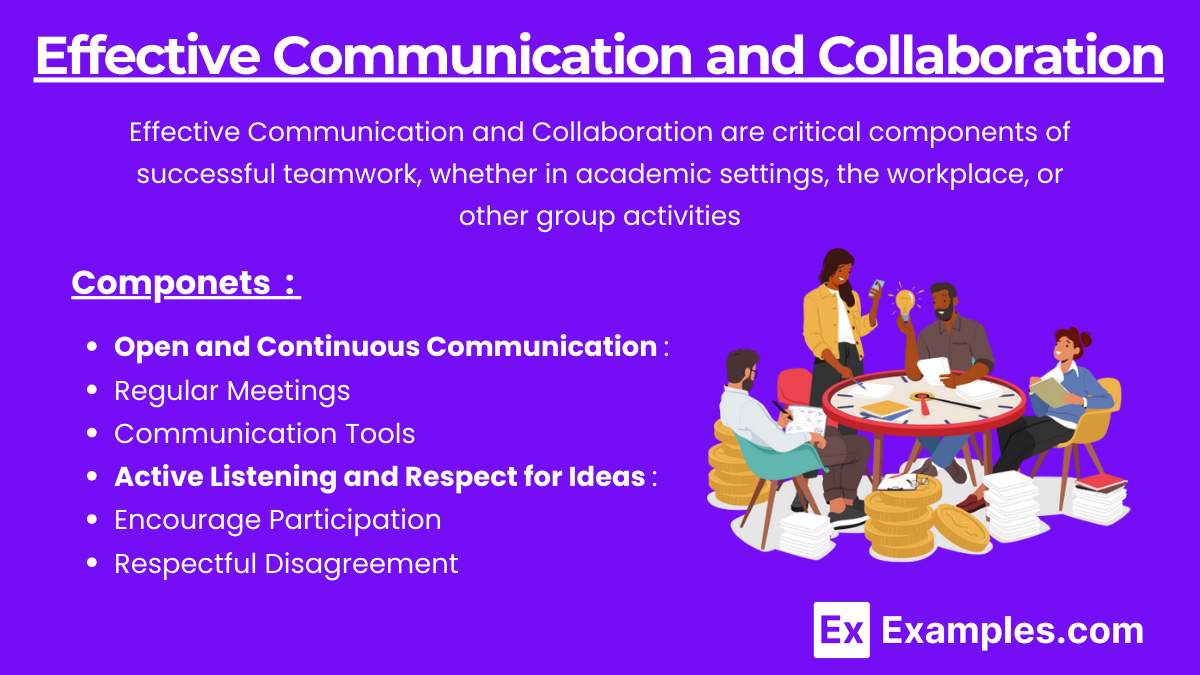
Effective Communication and Collaboration are critical components of successful teamwork, whether in academic settings, the workplace, or other group activities. here are key Componets below.
1. Open and Continuous Communication:
- Regular Meetings: Schedule regular meetings to discuss progress, challenges, and next steps. This helps keep everyone on the same page and address any issues promptly.
- Communication Tools: Utilize digital tools like Google Docs, Slack, or Trello for real-time collaboration and communication. These platforms facilitate document sharing, brainstorming, and tracking progress.
2. Active Listening and Respect for Ideas:
- Encourage Participation: Create an environment where all members feel comfortable sharing their ideas. Active listening shows respect and can lead to innovative solutions.
- Respectful Disagreement: It’s natural to have differing opinions. Approach disagreements constructively by focusing on the project’s goals rather than personal differences.
Research and Contribution of Original Work
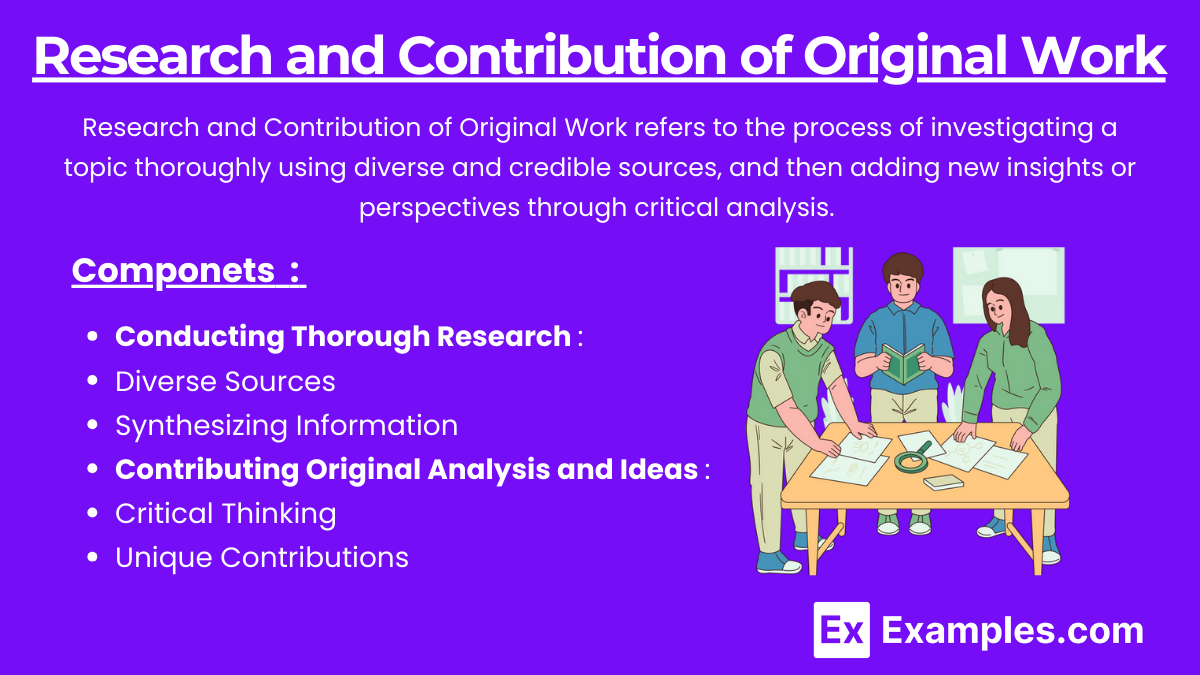
Research and Contribution of Original Work refers to the process of investigating a topic thoroughly using diverse and credible sources, and then adding new insights or perspectives through critical analysis. This involves two main components:
1. Conducting Thorough Research:
- Diverse Sources: Use a variety of sources, including academic journals, books, and reputable websites, to gather information. Ensure that all sources are credible and relevant.
- Synthesizing Information: Combine information from multiple sources to provide a comprehensive view of the topic. This synthesis is key to developing a well-rounded argument.
2. Contributing Original Analysis and Ideas:
- Critical Thinking: Analyze the information critically, identifying gaps, inconsistencies, or new angles. This critical analysis is crucial for contributing original work.
- Unique Contributions: Offer unique insights or interpretations that add value to the group project. Whether it’s a novel argument, a new research angle, or a creative presentation idea, original contributions can significantly enhance the project.
Writing and Presenting the Final Product
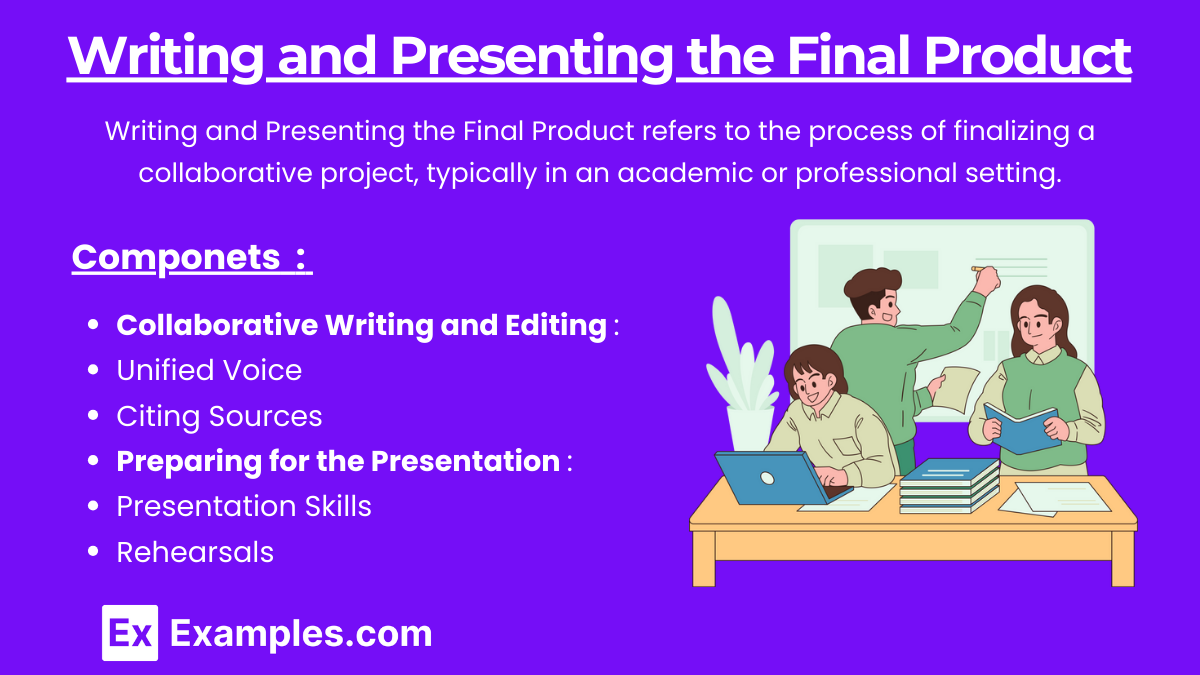
Writing and Presenting the Final Product refers to the process of finalizing a collaborative project, typically in an academic or professional setting. This involves two main components: collaborative writing and editing and preparing for the presentation. The goal is to produce a cohesive and polished document and deliver an effective presentation.
1. Collaborative Writing and Editing:
- Unified Voice: Ensure the final document has a consistent style and tone, reflecting the group’s collective voice. This may involve multiple rounds of editing and peer review.
- Citing Sources: Properly cite all sources to avoid plagiarism and give credit to original authors. Use the required citation style, such as APA or MLA.
2. Preparing for the Presentation:
- Presentation Skills: Develop strong presentation skills, including clear articulation, confident body language, and effective use of visual aids.
- Rehearsals: Practice the presentation multiple times as a group. This helps in refining the delivery, timing, and transitions between speakers.
Reflecting on the Group Work Process
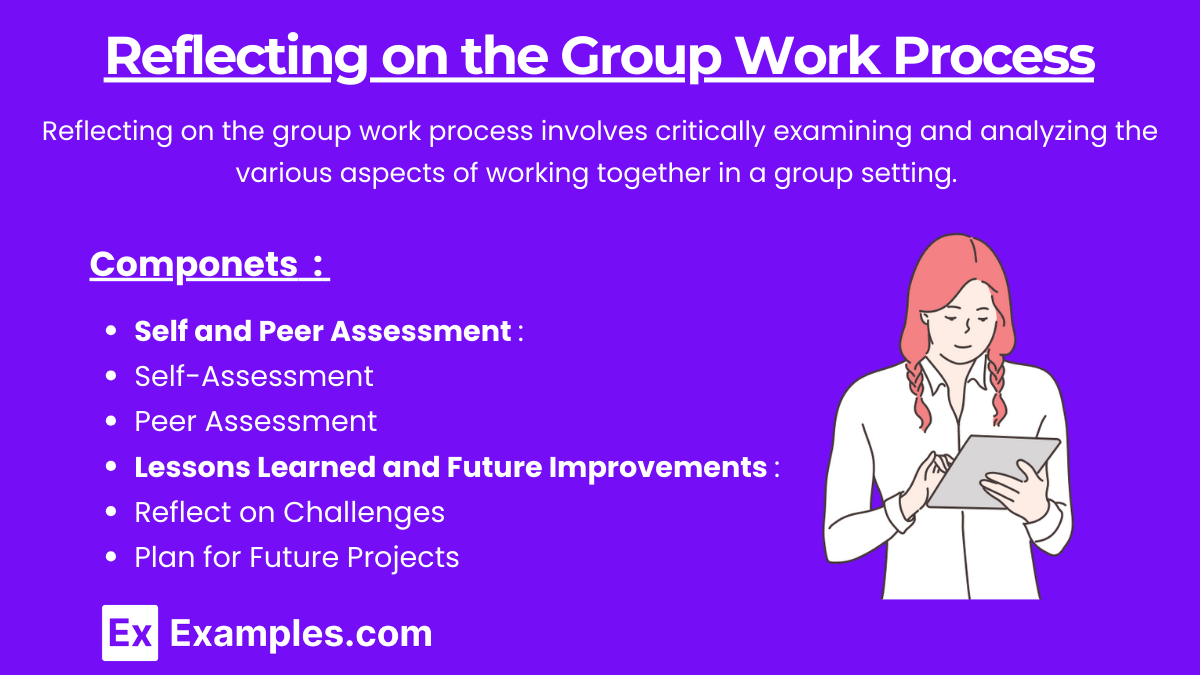
Reflecting on the group work process involves critically examining and analyzing the various aspects of working together in a group setting. This reflection includes evaluating both individual and collective contributions, understanding the dynamics of collaboration, and identifying strengths and areas for improvement. The process typically consists of self-assessment and peer assessment, allowing members to acknowledge their efforts and receive constructive feedback from their peers.
1. Self and Peer Assessment:
- Self-Assessment: Reflect on your own contributions, identifying strengths and areas for improvement. This helps in personal growth and prepares you for future projects.
- Peer Assessment: Constructively evaluate the contributions of your peers. This feedback can help the group identify what worked well and what could be improved.
2. Lessons Learned and Future Improvements:
- Reflect on Challenges: Discuss any challenges faced during the project and how they were addressed. This reflection is crucial for learning and improving in future group work scenarios.
- Plan for Future Projects: Use the insights gained to plan for future projects, focusing on better communication, time management, and division of labor.

